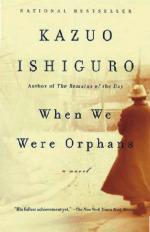
|
<%-- Page Title--%> Book Review <%-- End Page Title--%> |
||||||
|
<%-- Volume Number --%>
Vol 1 Num 133
<%-- End Volume Number --%>
|
|
December 12, 2003 |
|||||
|
<%-- Navigation Bar--%>
|
Kazuo Ishiguro's new novel, When We Were Orphans, is architecturally sound but curiously furnished. PHILIP HENSHER
When
We Were Orphans All in all, Kazuo Ishiguro is a pretty odd novelist. His voice is studiedly anonymous, unfailingly formal and polite, even under the most dramatic circumstances. He resists and, I think, dislikes what most novelists relish, the particular concrete detail which pins down a scene to a locality and a time. He resists, too, that other most concrete element of writing - the metaphor. Towards the end of When We Were Orphans, it reveals itself to be a variation on Great Expectations, but a less Dickensian novelist can hardly be imagined. Dickens only constructs a plot, one feels, so that he can write about the characters' shoes, the particular colour of someone's shirt, the particular smell of a full larder. For Ishiguro, the particular detail is impeding and irrelevant, and, even in a costume drama like this one, the events pass in a smooth, weightless movement, undistinguished by the gritty marks of the particular fact. The Unconsoled reads like a dream, in which the normal rules of time and space are suspended, and no dream is filled with intensely felt objects, intensely experienced physical facts. The calm reporting of the prose seemed entirely appropriate to the strange events of the book; it could not fully respond to the events, so it would set down what had happened with the simplest manner possible. In When We Were Orphans, the manner has, I think, become a problem. Again, the book has many virtues: it is surely developed and extended; it is full of ingenious variation; it builds to an admirable and satisfying climax. Its virtues, in short, are all architectural ones. It starts to present a problem when we look at the voice, the sentences, which, in the context, will not do at all. Christopher Banks is a fashionable society detective, solving fashionably ghastly crimes in 1930s England. In his past, however, there is an unsolved and traumatic crime which continues to torment him. He was brought up in Shanghai, with a father heavily involved in Western complicity in the importation of opium and a mother who campaigned fiercely against the trade. His parents crossed a major warlord, Wang Ku, and disappeared. Banks travels back to Shanghai, now riven by the Sino-Japanese war, and descends into the ruins of the city, searching hopelessly for the place where his parents might, just, still be held captive. Personal trauma as the world falls apart is classic Ishiguro territory, and in many ways he seizes the drama with both hands. It is striking how the ghastly 1930s shocker at the beginning moves into something altogether deeper as the book progresses. The single problem with the book is the prose, which, for the first time, is so lacking in local colour as to be entirely inappropriate to the task in hand. One can't only admire a book's structure. There is something troubling about Ishiguro's prose style that took me a while to pin down, and it's this - he hardly ever uses a phrasal verb. He is a writer who always prefers to say 'depart' rather than 'set off', 'discover' rather than 'find out'. Phrasal verbs are, in a way, at the heart of English; they are a part of the language which presents peculiar difficulty to the learner, since there is no logic whatever in their meaning, and they hardly ever resemble anything in another language. A Frenchman, learning English, would soon see the connection between 'discover' and 'dé couvrir'; 'find out', on the other hand, would seem to him like an exotic and irrational expression, which, despite its being more idiomatic, he might well choose to avoid. There is no logic to them; why 'get on with' and 'get off with' should mean what they do, rather than the other way round, cannot be justified, and yet they are at the heart of the spoken language. Ishiguro's avoidance of phrasal verbs is a major problem here - it gives his narrator a circumlocutious, cautious air which isn't really very helpful. More than that, it gives him a particular tone of voice which is not that of his social setting. It is bizarrely unconvincing as an idea of upper-middle-class London in the 1930s - I think Ishiguro will find that society beauties did not say 'pardon' then and do not now - and the inadequacy can be pinned down to the narrator's voice, and his choice of verbs, as much as the details. Here he is on his new digs: 'Although at that point I had yet to receive a single visitor in my rooms, I issued my invitation with confidence, having chosen the premises with some care. The rent was not high, but my landlady had furnished the place in a tasteful manner that evoked an unhurried Victorian past.' Receive, issue, furnish, evoke; Christopher Banks tells us that he is a 'society detective', but he sounds exactly like a policeman. Or, to be unkind, like a butler. Of course, there are splendid things in it; the games and huge terrors of a Shanghai childhood. Or the horrific descent into the lawless slums as Banks searches for his kidnapped parents, only partly marred by the way the prose will not budge an inch from its superb, unfeeling immaculacy: 'Most annoyingly, my right shoe had split apart, and my foot was badly gashed, causing a searing pain to rise with each step.' The
resolution is moving and graceful, but the problem of the voice is a
universal one, present and incredible in every sentence. © Guardian Newspapers Limited 2003 |
||||||
